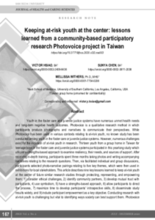Abstract
Youth in the foster care and juvenile justice systems have numerous unmet health needs and long-term negative health outcomes. Photovoice is a qualitative research method in which participants produce photographs and narratives to communicate their perspectives. While Photovoice has been used in various contexts relating to at-risk youth, no known study has been conducted among youth in the foster care or juvenile justice systems. However, numerous challenges exist for the inclusion of at-risk youth in research. Thirteen youth from a group home in Taiwan for teenage boys in the foster care and juvenile justice systems participated in this yearlong study which utilized a strengths-based approach to examine resiliency, their needs, and sources of support. After receiving in-depth training, participants spent three months taking photos and writing accompanying narratives relating to the research questions. Then, via facilitated individual and group discussions, participants selected photo-narrative pairings relating to five key themes, which were then used in exhibitions for local stakeholders. This article describes nine key lessons learned to keep at-risk youth at the center of future similar research studies through protecting, representing, and empowering them: 1) consider ethical challenges, 2) identify community partners, 3) develop mutual trust with participants, 4) use symbolism, 5) have a strengths-based approach, 6) allow participants to direct the process, 7) maximize time to develop participants’ introspective skills, 8) disseminate study results widely, and 9) include participant empowerment as a key objective. Conducting research with at-risk youth is challenging but vital to identifying ways society can best support them. Photovoice remains a meaningful way for marginalized communities to articulate their needs and share their experiences and perspectives. Recognizing and addressing logistical and ethical challenges early can ultimately lead to more impactful studies for at-risk youth both individually and systemically.

